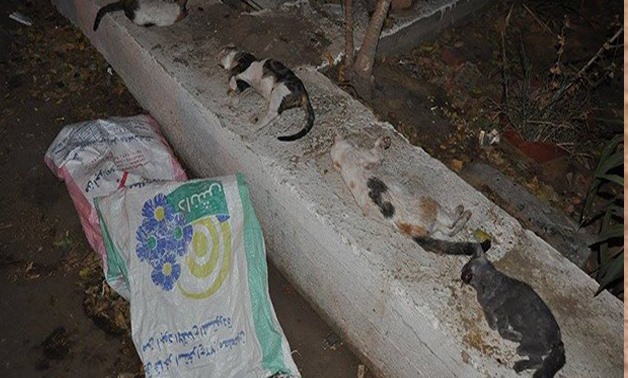
Photo for animal abuse-photo file.
CAIRO - 03 July 2017: Brutal incidents of animal abuse by peope are still prevalent in Egypt. In an attempt to show more awareness of the issue of animal rights, the Egyptian government actively seeks harsher punishment to penalize those who violate the rights of animals and to put an end to animal abuse.
Egyptians are known for being merciful to animals by nature. They learned to be kind and helpful to animals either following their religious teachings or abiding by general etiquette learned during childhood. Yet, some people are still very hostile towards domesticated animals out of fear, but this should never be allowed to escalate to the point of killing and poisoning these helpless living creatures.
Over the past few years, Egypt has seen many incidents of animal abuse, contrary to Egyptians' values of mercy and leniency, that caused outrage in Egyptian society.
The Gezira Club Massacre stands as one of the most famous practices of animal abuse. In June 2014, hundreds of photos poisoned stray cats circulated social media, illustrating the massacre carried out against these helpless animals. This ruthless practice had taken place at Gezira Club in Zamalek.
In reaction to this bloody practice, Egyptian animal organizations and social media users arranged a stand-in in front of the prestigious club in rejection of the massacre, according to the "Stop Gezira Club Massacres” Facebook Page.
Later, in November 2015, Ahly Club was harshly criticized over an alleged mass poisoning of stray cats. Tens of poisoned stray cats photos at Al Ahly headquarter at Cairo’s upscale district of Zamalek went viral on social media. The photos caused a backlash among activists and human rights groups. Mona Khalil, co-founder of the Egyptian Society for Mercy to Animals (ESMA) said she has referred an official complaint against the management of Al Ahly on basis of the incident and demanded punishing it in accordance with Article 357 of the Penal Code which criminalizes killing animals.
Putting an end to the needless suffering of helpless animals, and according to article 355 in the Penal Code, a person responsible for the death of animal with no “just” cause could face up to a year with hard labor in prison, or a fine no more than LE 200 ($11) for intentionally killing or poisoning livestock animals, or a living being in a river, a canal, or a basin.
Also according to article 357 of the Penal Code, a prison sentence of up to six months or a fine not exceeding LE 200 is the punishment for those who intentionally kill, poison, or cause damage to a domesticated animal
In this context, according to Article 358 of the Penal Code, punishment for whoever transgresses a property such as a cultivated or dry land owned by an entity or a person will face a prison sentence no more than three months or a LE 200 fine.


Comments
Leave a Comment